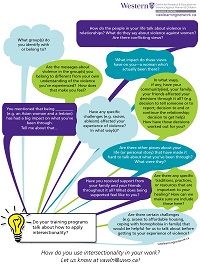Health & Well-being of Canadian Women
 This infographic provides a series of questions that can be incorporated into training programs to apply an intersectionalist apprach.
This infographic provides a series of questions that can be incorporated into training programs to apply an intersectionalist apprach.
View Infographic(PDF)
View Infographic(Image)
View Plain Text PDF
Do your training programs talk about how to apply intersectionality?
- Are there certain challenges (e.g. access to affordable housing, coping with homophobia in family) that would be helpful for us to talk about before getting to your experience of violence?
- Have you received support from your family and your friends throughout it all? What does being supported feel like to you?
- Are there any specific traditions, practices, or resources that are important to your healing? How can we make sure we include those here?
- Are there other pieces about your life (or personal story) that have made it hard to talk about what you’ve been through? What were they?
- You mentioned that being …….. (e.g. an Asian women and a lesbian) has had a big impact on what you’ve been through. Tell me about that…
- Have any specific challenges (e.g. racism, ableism affected your experience of violence? In what ways?
- In what ways, if any, have your community(ies), your family, your friends affected your decisions through it all? (e.g. decisions to tell someone or to report; decision to end or continue the relationship; decision to get help) How have those decisions worked out for you?
- What groups do you identify with or belong to?
- How do the people in your life talk about violence in relationships? What do they say about violence against women? Are there conflicting views?
- Are the messages about violence in the groups you belong to different from your own understandings of the violence you’ve experienced? How does that make you feel?
- What impact do these views have on you-a woman who’s actually been there?
This infographic emerged from Issue-Based Newsletter 15: Intersectionality.
This collection of Learning Network resources is designed to synthesize and disseminate knowledge on topics related to Gender-Based Violence (GBV). These resources provide foundational GBV knowledge including commonly used language, important gaps and emerging issues, recent research, and important educational tools and resources.
All original materials produced by the Learning Network are open-access and can be re-used and re-distributed as long as there is proper recognition of the author and/or Learning Network.
All our resources are open-access and can be shared (e.g., linked, downloaded and sent) or cited with credit. If you would like to adapt and/or edit, translate, or embed/upload our content on your website/training materials (e.g., Webinar video), please email us at gbvln@uwo.ca so that we can work together to do so.






